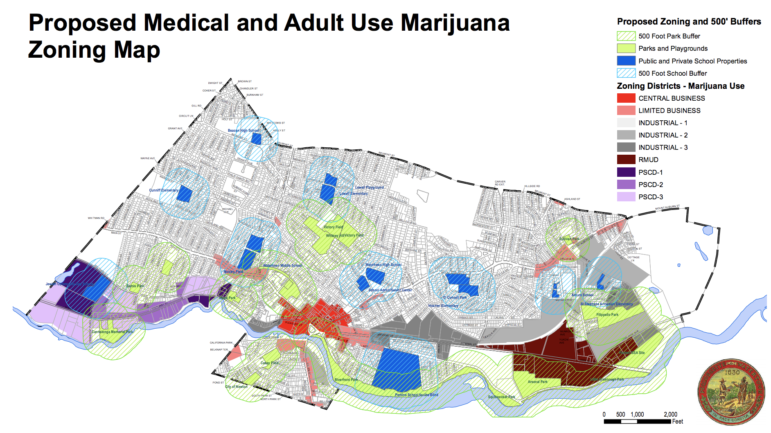
At the same time as Massachusetts began allowing the retail sale of marijuana for recreational use, the Watertown Town Council adopted regulations for selling, creating and testing recreational cannabis products.
The discussion of the new regulations took more than two hours during Tuesday’s Town Council meeting, with councilors concerned about the where the retail establishments can be located, the number of establishments, and how to regulate labs that test marijuana.
Towns can vote to ban all recreational marijuana establishments, said Town Attorney Mark Reich. However, because Watertown voters supported Question 4 in 2016, the town would have to put an ordinance to ban retail marijuana on the ballot and have it approved by the voters. Sixty percent of voters voted Yes on the question to legalize the sale of marijuana for recreational use.
Town Council President Mark Sideris said that because voters strongly supported Question 4, he did not advise trying to overturn it with a local vote.
“I don’t think there is the appetite to have another election,” Sideris said.
Residents who spoke had a mix of views on having recreational marijuana retailers in town, but more were against it. Many said, however, that they do not have a problem with labs that test marijuana for medical use. A representative of a group that grows marijuana for sale said that unlike retail establishments, cultivators do not have long lines, create traffic, or have large amounts of cash on hand.
Communities can take other steps to limit where marijuana retailers, growers, manufacturers of cannabis products, and labs can be located. Also, they can put a cap on the number.
Under the new town regulations, marijuana retailers and facilities can only be located in certain zones of town: Industrial 1, Industrial 2, Industrial 3, Limited Business Districts, Central Business Districts, the Pleasant Street Corridor District, and the Regional Mixed Use District. Anyone looking to open such a facility would need to get a special permit from the town’s Planning and/or Zoning boards. They would also need to get a local host agreement approved by the Town Council and a license from the State’s Cannabis Control Commission, Reich said.
Councilor Angeline Kounelis worried that many of the areas where marijuana retailers and facilities could go, particularly the limited business districts, are located right next to residential neighborhoods.

Town of Watertown
A map showing the buffer zones where recreational marijuana facilities would not be allowed. The zones are around K-12 schools and parks. One school, located in the Sacred Heart Parish property at the far east end of Mt. Auburn Street, was left off this map.
Buffer Zones
The proposal also called for putting 500 foot buffers where no facilities could be located around public and private schools with any grades from kindergarten to 12th grade. Also, they put a 500 buffer around parks, playgrounds, and recreation areas, including town and state parks. He said there is a concern that people may purchase marijuana and then use it in a park.
There is also a buffer of 500 feet between any two marijuana facilities.
Assistant Town Manager Steve Magoon said there were changes made from the medical marijuana zoning previously adopted by the Town. That included a buffer around daycares, preschools and places where children frequently congregate. These were removed in the state statute, Magoon said, and the proposal followed suit.
“Why the state took (daycares and preschools) out? I don’t think there is demonstrated harm of preschoolers going past a facility that sells marijuana,” Magoon said. “As they get older, there is concern.”
Kounelis said she is concerned about children, even preschoolers, going past a retail marijuana facility with the lines that have been seen at the recently opened dispensary in Leicester.
She also noted that the map showing the buffer zones included in the Council packet does not include the private school located on the Sacred Heart Parish property, on the far east end of Mt. Auburn Street.
The Planning Board considered having buffer zones around a facility like the Watertown Boys & Girls Club built for children, but did not put it in the recommendation. Magoon said the club falls within the buffer around Saltonstall Park.
Councilor Ken Woodland said he opposed having buffers around parks, and preferred to have it treated like places that sell alcohol.
“I don’t think it holds enough water to add enhanced scrutiny,” Woodland said. “I think it is hypocritical to say the safety of nearby area is a concern when we have just added 15 new liquor licenses, including one explicitly for a performing arts center where children congregate.”
Woodland proposed removing the buffer ones for parks, but the motion died when it was not seconded.
The Council approved the buffer zones around schools and parks.
Limiting the Number of Facilities
Towns and cities can limit the number of marijuana facilities down to 20 percent of the number of package store licenses in town without going to the voters. In Watertown there are 14 package stores, and 20 percent of that is 2.8, so the Council could vote to set the limit at three facilities. This includes retailers, cultivators, and cannabis product manufacturers.
The original proposal considered by the Council did not include this limit. With all the zoning restrictions and buffer zones, Magoon said, that effectively limits the number of facilities to three.
Reich noted that while the current buffers may limit the areas to three retail locations, schools may move or close, so it may open up possible locations.
Councilor Anthony Donato said he not only supported having the 20 percent limit, he believes that if applicants know there are a limited number they will “put their best foot forward” when proposing a retail location or marijuana facility.
Councilor Anthony Palomba opposed having limit at 20 percent. He said he did not believe it was necessary because the zoning effectively did the same thing. Woodland that he is not convinced the town needs to limit the number of marijuana retailers, again pointing to the number of alcohol licenses in town.
The Council voted 7-2 to approve the limit of 20 percent of package stores, with Woodland and Palomba opposing it.
Marijuana Testing Labs
Most Councilors agreed that they did not mind having cannabis testing facilities in Watertown, especially if they are testing for medical uses. However, the majority also wanted to make sure that residents know where such labs are located.
Before the vote, the Town’s zoning allowed any labs under 4,000 sq. ft. to open as right, without appearing before any town boards. Sideris made a motion to require labs of any size get a special permit before opening. That way the public would be aware where facilities testing marijuana will be located.
Woodland said he did not think that the step was necessary because such facilities would have to sign a host agreement with the Town Council and get a license from the Cannabis Control Commission. Councilor Caroline Bays agreed, saying she believed that would let people know about a proposed lab.
Sideris said he did not think the host agreement would not create the same level of public awareness as having to get a special permit.
Palomba said he strongly supports having such testing facilities because they test medical uses, as well as test for contaminants to make sure the marijuana is safe to consume.
The labs would not count toward the limit of three marijuana facilities, and the number of labs was not capped.
The Council voted 6-3 to approve the change to require a special permit, and limited it to the same zoning districts as retail facilities. Palomba, Woodland and Bays voted against it.
When the Council considered the overall package, with the amendments, members voted 8-1 with Kounelis voting against it.

If anyone thinks the high traffic volume and gridlock in the East end and Pleasant Street corridor are bad now, just wait until one of these open up in town! I hope the Town Council is keeping a watchful eye on the misery the constant traffic flow and long lines of stoners has brought on the residents of Leicester MA since Cultivate opens its doors.
The only reason Leicester is experiencing the traffic flow is because it is one of only TWO locations in the entire Commonwealth. These issues will be alleviated as more of these shops open statewide. Watertown could certainly use the monies generated by these businesses to improve or build new schools, improve roads, benefit fire and police, etc. Also – degrading the customers of recreation marijuana products is ignorant and mean spirited. Do you also speak ill of every person walking into a liquor store? Alcohol kills far more people than a joint ever will.